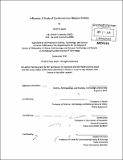Influenza : a study of contemporary medical politics
Author(s)
Doshi, Peter Nikolai
DownloadFull printable version (40.51Mb)
Alternative title
Study of contemporary medical politics
Other Contributors
Massachusetts Institute of Technology. Program in Science, Technology and Society.
Advisor
Theodore A. Postol.
Terms of use
Metadata
Show full item recordAbstract
Over the past decade, the prevention and control of seasonal and pandemic influenza has grown to be one of the largest and most visible public health policies. This dissertation considers contemporary influenza policy as a case study in what I call medical politics, in which a disease that for most people is rather unremarkable has become the focus of intense (and costly) public health campaigns based on a shaky scientific basis. The dissertation seeks to explain how this could happen. The first two chapters show how influenza and its pandemics are marketed through an appeal to numerous scientific claims. Drawing on governmental marketing materials, statements by officials, and policy documents, I try to let officials speak for themselves and, as much as possible, refrain from analysis. Chapter 3 tells the story of the 2009 novel influenza H1N1 outbreak, showing how official understandings about influenza were called into question by an outbreak far milder than experts had predicted, and discusses investigations which highlighted the role of industry in shaping influenza policy. Chapter 4 analyzes official scientific claims regarding influenza, and argues that degree to which influenza is a serious public health problem is actually unclear. Furthermore, influenza vaccine effectiveness has been vastly overstated, predictive models of pandemic influenza are demonstrably flawed, and officials conflate true influenza with influenza-like illness (ILl), an often overlooked but critical distinction which allows officials to mislead the public into holding false assumptions about the potential benefits of influenza vaccine. Chapter 5 highlights the centrality of "virus-centric thinking" and the ethic of "saving lives" in public health practice as important factors that help explain how such a situation can exist and persist in light of the evidence. Chapter 6 addresses the policy implications of the dissertation's findings.
Description
Thesis (Ph. D. in History, Anthropology, and Science, Technology and Society (HASTS))--Massachusetts Institute of Technology, Program in Science, Technology and Society, 2011. Cataloged from PDF version of thesis. Includes bibliographical references (p. 271-312).
Date issued
2011Department
Massachusetts Institute of Technology. Program in Science, Technology and SocietyPublisher
Massachusetts Institute of Technology
Keywords
Program in Science, Technology and Society.